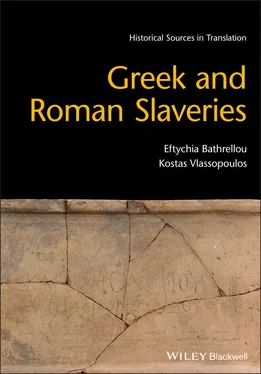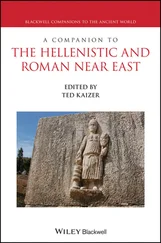Finally, is it possible to identify the voice of slaves in the extant ancient sources, given that most sources were written by elite authors, who were usually slaveholders? To what extent can we use fictional slaves to reconstruct the lives and views of real slaves (2.16–21)? Can we trust inscriptions that purport to present the slaves’ own words (2.22)? How reliable are the statements and narratives of elite authors for understanding slaves (2.23–4)? And when we have texts written by people who had experienced slavery, how useful are they for reconstructing that experience (2.25)? Debating these methodological problems is a necessary first step for studying the wealth of evidence on ancient slavery and slaves.
IDENTIFYING SLAVES IN DOCUMENTARY SOURCES
Literature: Schumacher 2001; Bruun 2014; Maffi 2014; Straus 2016; Chaniotis 2018; Zelnick-Abramovitz 2018.
2.1 IG II 22940: Greek Dedicatory Inscription, Laureion, Attica (Fourth Century BCE)
Laureion, in southeastern Attica, was the site of the Athenian silver mines, where thousands of slaves used to work (see also 4.10, 7.2, 8.27). Some of the names mentioned below are Greek (Kallias, Artemidoros, Sosias, Hermaios), while others are foreign names, from Paphlagonia (Tibeios, Maes), Phrygia (Kadous, Manes, Attas), Bithynia (Sangarios), and of other imprecise origins (Hermos). The name of the deity honored has not survived fully on the stone and can be restored in various ways, as Men Tyrannos or god Herakles.
Literature: Zoumbaki 2005; Vlassopoulos 2010, 2011b, 2015; Hunt 2015.
The following eranistai 26offered this dedication to [Men Ty]ra[nnos] for good fortune: Kadous, Manes, Kallias, Attas, Artemidoros, Maes, Sosias, Sangarios, Hermaios, Tibeios, Hermos.
What group is responsible for this dedication?
How do they describe themselves? Do they identify their legal status?
Can we draw any inferences on the basis of the dedicators’ names? Do these names indicate a single origin or a variety of origins?
Can we draw any inferences from the find spot of the inscription?
If these people are slaves, what can we learn about slavery from their collective dedication?
2.2 IG XII.1 881: Greek Funerary Inscription, Rhodes, Dodecanese (Hellenistic Period)
All three individuals mentioned in this epitaph have Greek names. Phronimos and Euphronios share the same root.
Literature: Boyxen 2018: 82–93; Lewis 2018: 277–82.
Phronimos, Galatian. Artemisia, Syrian. Euphronios, engenês . 27
What are the names and nationalities of the three individuals commemorated in this epitaph?
Do these three individuals have the same origins? What conclusions can we draw from this?
Are these three individuals slaves?
Are there any onomastic links between these three individuals? How can we interpret this? Why are these three individuals commemorated together? What can we infer about their relationship?
2.3 Masters and Fathers
2.3.a SEG XV 787: Greek Dedicatory Inscription, Galatia (First–Third Century CE)
Personal names are often followed by a male name in the genitive case in Greek. In the case of free men, the name in the genitive is that of the person’s father. In the case of slaves, it is not always clear whether the name in the genitive is that of their father or their master. Alypos and Limnaios are male names.
Literature: Robert 1955: 28–33; Drew-Bear 1999: no. 609, 374–6.
Alypos (son or slave) of Limnaios, as fulfillment of a vow to Mother Malene, on behalf of his masters, and the livestock and the dogs.
What is the status of Alypos? How can we establish it?
Why does Alypos make this dedication? What can we learn about him from this inscription?
Is Limnaios the name of his father or of his master? Can we tell?
If Limnaios is the father of Alypos, does this tell us anything interesting about the natal alienation of slaves (cf. 1.11–12)?
If there are major differences in how often slaves in different societies or periods mention their fathers’ name, how do you think we should explain this?
2.3.b Polemon 2 (1934–40) Supplement, 13, 18.27–34: Greek Inscription Recording Manumissions, Thaumakoi, Thessaly (First Century BCE)
In Thessaly, manumitted women and men had to offer to the city treasury the sum of 15 staters upon their manumission. Whether this was a manumission tax or a fee for registering the manumission is debated by modern scholars. Manumitted slaves had to have a prostatês (patron), a role usually undertaken by their former master.
Literature: Zelnick-Abramovitz 2005: 259–62, 2013.
When Gorgias, (son) of Philiskos, of (the city of) Gyrton, was general, and Astomachos, (son) of Tychaios, was treasurer, the following were manumitted on the third day of the month Aphrios: Armenos of Philodemos and Archiboulos of Agathon (were manumitted) by Philodemos, (son) of Pyrrhandros. And each of them gave the 15 staters.
What are the names of the two manumitted slaves? What is the name of the manumittor?
Notice the two personal names in genitive (of X) that follow the names of the slaves. How do they relate to the name of the master?
Are the genitives after the slaves’ names the names of the master, the names of the slaves’ father, or the names of their patron?
If it is the name of the father, what implications does this have about the natal alienation of slaves? If it is the name of the patron, why do these slaves have different patrons?
2.4 SEG L 276: Greek Letter Inscribed on Lead Tablet, Athens (Fourth Century BCE)
Literature: Jordan 2000; Harris 2004; Eidinow and Taylor 2010; Vlassopoulos 2018b.
Lesis is sending this message to Xenokles and to his mother, not to overlook at all that he is perishing in the foundry, but to go to his masters and find something better for him. For I have been handed over to a very wicked man. I’m perishing from being whipped; I’m tied up; I’m treated like dirt – more and more.
What might the relationship between Lesis and Xenokles be?
Who are Lesis’ ‘masters’? How should we understand this term?
What is he doing in the foundry? How is he treated there?
Is Lesis a slave? What problems can you envisage for such an interpretation?
If Lesis is not a slave, how do you envisage his status?
How does Lesis try to sort out his problems? What connections and networks does he employ?
2.5 P.Ups.Frid. 7: Papyrus with Document in Greek, Unknown Provenance, Egypt (275 CE)
Literature: Llewelyn 1992: 60–3.
Isidoros to Ammonilla. Greetings.
Since you have been my servant girl ( korasion ) for some time, I give you the authority from now on to go wherever you wish, without any reproach from me. […]
What is the relationship between Isidoros and Ammonilla? What term is used to describe Ammonilla?
What is the point of this document? Why was it written?
Can we tell if Ammonilla was the slave of Isidoros?
2.6 IC IV 72 ii2–10: Inscribed Laws in Greek, Gortyn, Crete (Fifth Century BCE)
The provisions below belong to the famous Gortyn Code. The term doōlos ( doulos in Attic Greek) is a typical Greek term for “slave”; the term woikeus ( oiketês in Attic Greek) is also commonly used for “slaves.” The use of both terms in the same legal texts has created a debate between scholars who think they have the same meaning and those who think that doōlos refers to slaves, while woikeus to a different group of “serfs.” The term apetairos , which literally means one excluded or banished from a hetaireia (that is, an association of “comrades”), seems here to refer to a free man but of a status lower than that of full citizens.
Читать дальше












